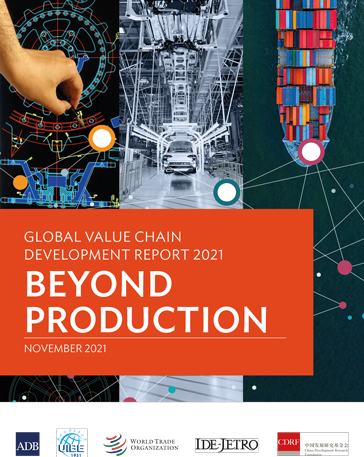PUBLICATIONS
More
Early evidence emerging from the ongoing pandemic indicates that GVCs have played a key role in supporting economic recovery and are evolving in important ways, according to the “Global Value Chain Development Report 2021: Beyond Production,” co-published by the WTO, the ADB, the Research Institute for Global Value Chains at the University of International Business and Economics, the Institute of Developing Economies, and the China Development Research Foundation. There has been no generalized reshoring of production in response to the pandemic, the report states, and GVCs have shown resilience, after initial disruptions, in addressing the needs for food and essential medical goods.
“As COVID-19 recedes, GVCs will no doubt be a major influence in the recovery to come. This recovery must be used to reinvigorate a trading system that serves and improves the lives of everyone,” WTO Director-General Ngozi Okonjo-Iweala and ADB President Masatsugu Asakawa note in the foreword of the publication. “Understanding where, in these chains, value is created and how it is shared among its actors is central to ensure that everyone obtains a fair share in the gains from trade.”
The report breaks new ground by providing analysis on GVCs beyond manufactured goods, detailing how value added in GVCs is increasingly generated through intangible products, such as services and intellectual property. The rise of services GVCs offers a new opportunity for developing countries to play a more active role in world trade and to boost economic growth, the report notes. It also explores the role of GVCs in spurring technological innovation.
Among the recent trends in GVCs highlighted by the report is the growing contribution of developing countries, particularly Asian economies, which have dramatically increased their share of GVC trade.
Moving forward, governments must consider increased investment in areas such as digital infrastructure and the training of workers to make GVCs more effective and more resilient not only to pandemics but also geopolitical, environmental and cyber risks. The report recommends outward-oriented strategies that are environmentally sustainable and market-oriented, and committed to labour protection, multilateralism, peaceful exchange, non-discrimination, reciprocity and transparency.
Share
Share
Problems viewing this page? If so, please contact [email protected] giving details of the operating system and web browser you are using.
